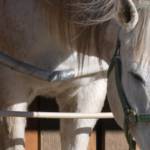Anemia in Horses

Anemia is a condition in which the blood is deficient in red cells, hemoglobin, or total volume. Signs of anemia in horses may include poor performance, lack of energy, weakness, lethargy, loss of appetite, and depression.
If a horse is determined to be anemic, veterinarians can investigate several possible causes that can lead to this condition. Surprisingly, one of the least common is iron deficiency, especially if the horse has access to pasture, because the horse ingests some iron with the dirt that clings to forage.
The most common cause of anemia in horses is known as anemia of inflammation, which is a natural reaction of the body to hold onto its iron stores to help inhibit bacterial growth. For a horse with anemia, it is important to look for infections such as pneumonia or abscesses.
Blood loss, such as from gastric or colonic ulcers, can also cause anemia. Usually the blood protein in these horses is low as well. Other less common causes of anemia include equine infectious anemia (what the Coggins test detects), piroplasmosis, cancer, and autoimmune disease. Racehorses that have been given erythropoietin to boost red cell counts can develop a fatal anemia. Horses that are bleeders generally do not lose enough blood to become anemic.
Many possible causes of anemia can generally be ruled out with a physical examination.
Several diagnostic tests can be used to help determine the cause of anemia. These include a complete blood count and other lab work, a Coggins test, and a bone marrow aspirate. A veterinarian is the best source of advice to determine the horse’s status, cause of the problem, and treatment.








